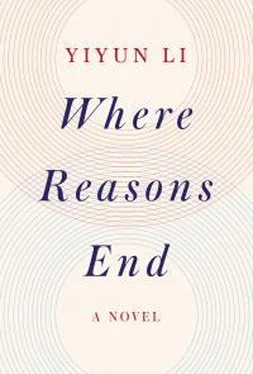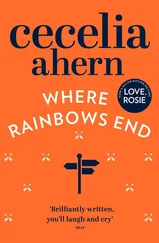What is outside your room? Nikolai asked.
I looked out of the window. Just the evening before, while cooking dinner, it had occurred to me that I could not open the window to pick a few bay leaves as I used to. Bay leaves came now in a little glass jar, sold on a shelf in a grocery store.
Flowers, I said, once the winter is over.
Well done, Mommy, he said. Flowers make a middling delusionist.
8
The Perfect Enemy
We baked a pumpkin pie yesterday, I said. Nikolai didn’t speak right away, but I was certain he was listening. It wasn’t as pretty as yours but it tasted good, I said.
It was the day after Thanksgiving. We as a family had never been good at celebrating. When Nikolai was in kindergarten, his teacher had had a conversation with me. We interviewed the kids, she said, and Nikolai said you celebrate many things but nothing seriously. Family tradition, she emphasized, is important for children.
Are some days more special than others, or are we giving them names and granting them meaning because days are indifferent, and we try to wrangle a little love out of them as we tend to do with uncaring people? These questions were not profound but they led to my halfheartedness about birthdays and major holidays. The others—anniversaries, Mother’s Day, Father’s Day, Valentine’s Day, a parade of holidays on the Chinese lunar calendar—were just that: days where we live.
Even so I had dreaded the first holiday without Nikolai. He used to bake around holidays. This time, I decided, we must make a pie ourselves.
He used to bake on weekends and on the days when he did not have much homework. He used to bake all the time, and how could we reproduce all the time ? Butter and cream and honey and cinnamon and vanilla and nutmeg and clove and all the jars and bottles on his baking shelf: No one’s words, Proust’s included, could bring back to life their warm fragrance mixed with the scents of the winter rain of California and the wet eucalyptus leaves. You owe us an invention to immortalize scents, Mr. Edison. Without that our memory is incomplete.
At least the world is not inundated even more, Nikolai said. All the photographs and homemade videos. Imagine the Internet with smells and tastes.
The dead have the advantage of the leavers; those left behind have to have something to hold on to. But this I did not say. I should be the last one to make that argument. While unpacking after the move, I realized what a bad memory-keeper I was. School pictures from some years surfaced but not from other years. An oversize album had only one page filled in, an ultrasound image of Nikolai when I was twenty-two weeks pregnant. The books in a complete set of Tintin, which had been Nikolai’s favorite series in preschool, were scattered and not all recovered, as were those from the set of Peanuts that had accompanied us for years. The volumes I had found from the Peanuts collection were the ones he had been reading in the last days of his life.
There is never an end to what people want, I said.
If you want to be greedy, he said, make sure you’re discerningly greedy.
We are who we are, I said. It was a hollow line, used often these days as though it could mitigate the pain in a hollowed-out heart.
Whatever that means, he said.
Nothing, I said. Saying something that means nothing is a skill you have yet to learn.
I’m glad I don’t have to learn that, he said.
Saying something that meant nothing had become a new way for me to delude myself, as though something had changed. Nothing changed. Time stood still, for him and for us.
So you’ve settled in? he said.
Settled into what, I thought, days without him?
I mean the house.
We’re like three little peas in a giant pod, I said.
The week before, I had explained to a friend that Nikolai could fill a space better than the rest of us combined. We had imagined a life in the house together, his cookies and cakes baking in the oven, his flowers blossoming in the garden, his music filling the house, his leaving and homecoming both cherished because what we had wanted most for him was the liberty to depart and the freedom to return. Mommy, I’m going to live with you until I turn seventy-three, he had said when he was three. No, no, I had said, you’ll change your mind. Soon after, not yet four, he had changed his mind. I’m ready to move out, he had told me. No, no, I had said, you’re still young.
There is no rule against anything, including settling into too empty a space, he said. Makes you feel organized.
Emptiness is different from unclutteredness, I said.
Clutter up then, he said. Clutter, clatter, clot, cluster.
None of the words, I thought, would release me from the void left by him.
You’ll settle in sooner or later, even if it’s against your wish, he said.
It occurred to me that I had never looked up the etymology of the word settle, so I did. I read it to him: from Old English, setlan, from setl, seat—to seat, bring to rest, come to rest. Can parents’ hearts find repose after the death of a child?
Perhaps I’m the one to ask the question, I said. Do you feel settled?
If you mean something sinking to the bottom, he said, yes, I feel quite settled. Sedimented.
What is it that’s sedimented? I asked.
Everything about me that used to disturb me, he said. I’m all clear now, pure and perfect, just the way I want.
Nothing will come to disturb the sediments again?
What probability do you think there is for that to happen?
I did not know if I was sad or relieved, or sadder because I was relieved.
You see, this is your problem. When you don’t have an expert command of adjectives, you don’t know how you feel.
Perhaps I don’t want to know, I said.
Why, then, are we talking?
I don’t talk with you to figure out how I feel.
Why else? You’re not going to say it’s to keep me alive, that kind of nonsense?
I thought about a book called This Real Night by Rebecca West. For days and weeks after Nikolai’s death I had often thought of the title. Since the moment I had learned of the news I had not had a moment of doubt about the coldest and darkest truth befalling us: This real night is and will be a permanent part of our life.
Fortunately for you and fortunately for me, I said, I don’t believe in that nonsense.
Good, he said.
But J. and I are starting a memory book for you, I said.
Good grief, he said.
His psychologist recommended it, I said. I do think she has a point. Memories fade.
Why not allow the fadable to fade? he said.
Why not let the erasable be erased? I said.
Why not indeed? Everything in life fades or gets erased in any case.
I suppose you’re right, I said.
Of course I’m right, he said. I’m so right I’m infallible.
For a moment I almost believed he was alive again, and I could hear him, his voice and his tone when he used to laugh at us, the fallible grownups.
Perhaps human history is driven by the desire to fight against our fadable and erasable fate, I said.
What pompous nonsense, he said. I hate it when you try to sound smart.
Well, we’re starting the memory book in any case.
I can’t stop you? he asked.
Just as I can’t stop you from doing what you want to do.
Fine.
Not to make you more annoyed, I said, we have a perfect notebook for the project.
While I was unpacking I had found an old journal he had started at five, with a title “Sixty Years of Nikolai” written on the inside cover. He had kept it for less than two weeks, and had resumed with two entries when he was eleven, one starting with “Sorry it’s been a long time!” and the second, four days after New Year’s, “Sorry to be late! Happy new year!”
Читать дальше












